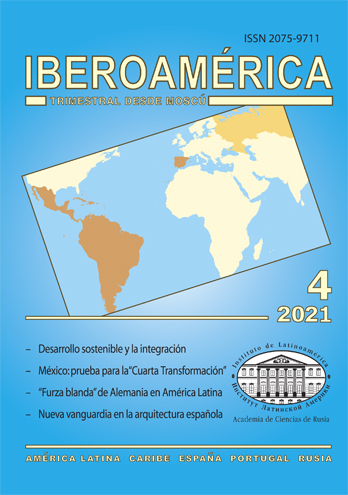
This issue is divided into four sections. The first section opens with an article by D. V. Razumovskiy, “Sustainable Development on the Latin American Integration Agenda.” The author provides a survey of the instruments and mechanisms operating in Latin American integrative associations that directly or indirectly affect the achievement of sustainable development goals. In their development, Latin American associations tried to repeat the successful European experience, though ran into a lack of resources. According to the author of the article, the environmental agenda still has not become a new unifying principle for the main Latin American integrative coalitions, many of which go through the crisis of their development.
In the second article, “Democracy: From Triumph to Decline,” Colombian researchers Armando Estrada Villa and William Serón Gonzalez examine the problems that the democratic regime is experiencing in the modern world. Through the analysis of the investigations by a number of well-known authors they come to the conclusion that corruption, corporatism, plutocracy, partocracy and populism led to the decline of democracy as a political system and ultimately to its crisis.
The second section begins with an article by O. O. Krivolápov and N. V. Stepánova, in which the authors trace the changes that have occurred in the U.S. military policy towards LAC countries after the ascension of the Biden administration and under the influence of COVID-19. The authors also investigate non-military programs in the security sector. They come to conclusion that whereas the main goals of military policy are still limited to the formula “combating drug trafficking, organized crime and illegal migration,” the recent U.S. policy in the region has often been aimed against the expansion of influence of China and Russia.
The next article analyzes the politics of “soft power” of the Federal Republic of Germany in the countries of Latin America. Its author S. A. Tatunts reveals the point of the conceptual correlation between the historical experience of Germany and the politics of “soft power”. The author finds out the features of the German model and the rationale for the choice of the countries of the region as an object of the politics of “soft power”. A certain lack of special and comprehensive studies of the policy of “soft power” of the Federal Republic of Germany in the specified region is being compensated.
The next two articles in this section focus on contemporary Mexico. The author of the first paper A. N. Borovkov raises the question of the viability of the leftist government of López Obrador. Based on the results of the midterm parliamentary elections of 2021 and the specific steps of the leftist administration, it is concluded that President L. Obrador continues to enjoy the support of the majority of the population. However, this support is declining. Therefore, the future of the left project in Mexico depends on what the protagonists manage to do in the remaining three years of their staying in power.
The authors of the second article in this section, Gabino Solano Ramírez and Kenny Acuña Villavicencio, use the events in the Sierra de Guerrero region as an example to consider a phenomenon that has attracted the attention of the Mexican and world public. What is meant here is the forced expulsion of peasants and the struggle of criminal organizations for control over one of the areas where poppy is grown and timber is extracted. The article also explains the role of the state in the growth of violence and in the displacement of peasant communities from their lands.
A special section in the issue highlights the most pressing global problem today associated with the COVID-19 pandemic. The article by L. P. Voronkova examines its impact on the tourism industry in Latin America and the Caribbean and shows the features of the ongoing reorganization in Latin American tourism. The author sees a way out in the commitment to digitalization of the tourism industry and the multilateral cooperation of all countries of the region.
In the section dedicated to Spain, E. V. Astákhova and N. V. Rostov explore current trends in its social policy. The authors show that on the background of the new coronavirus infection specific countries are trying to bring the economy out of crisis by giving an impetus to the social sphere. The most illustrative example is Spain, where the leftist coalition government, in tough external and domestic political conditions, is trying to mitigate the consequences of the COVID-19 pandemic by widely implementing the instruments of basic social protection.
The last article in this section is devoted to contemporary Spanish architecture. Its author N. A. Shéleshneva-Solodóvnikova regards postmodern architecture as an “inclusive type”, and the new avant-garde as an “exclusive type”. A particular attention is paid to the work of Ricardo Bofill, the brightest representative of postmodernism in Spanish architecture, and the work of such world-class architects as S. Calatrava Waltz, F. Gehry, J. Nouvel, O. Niemeyer, N. Foster, Z. Hadid. The article is supplemented by colored illustrations of the most famous works of Spanish architects.
IBEROAMERICA, 2021, num. 4 (October – December)
Content
PROBLEMS OF SUSTAINABLE DEVELOPMENT AND OF DEMOCRACY
Dmitriy V. Razumovskiy. Sustainable development in the Latin American integration agenda
Armando Estrada Villa, William Cerón Gonsalez. Democracy: from your triumph to your decline
LATIN AMERICA - USA, GERMANY, MEXICO
Svetlana A. Tatunts. Germanýs soft power policy in Latin America
Anatoly N. Borovkov. Mexico: midterm elections - test of the “Fourth Transformation”
PANDEMIC AND TOURISM
Lyudmila P. Voronkova. Latin American Tourism in Face of the Coronavirus Crisis
Elena V. Astakhova, Nikita A. Rostov. Current Trends in Social Policy in Spain














